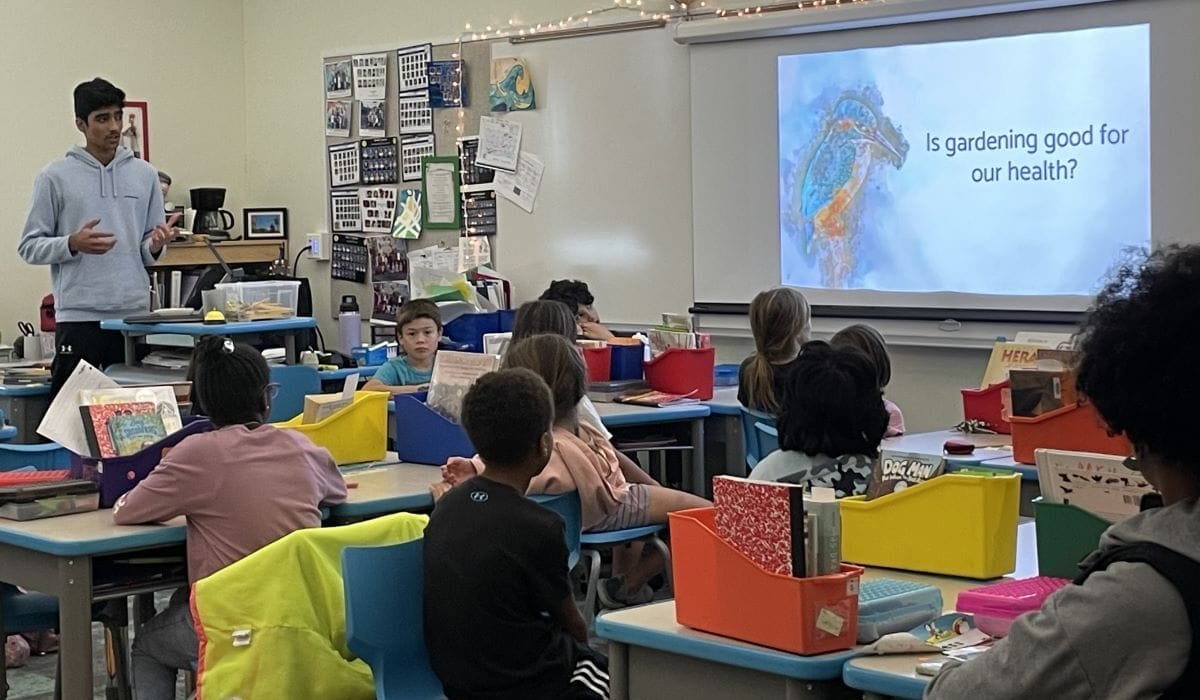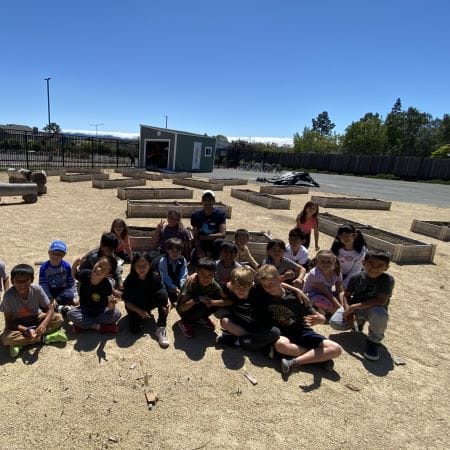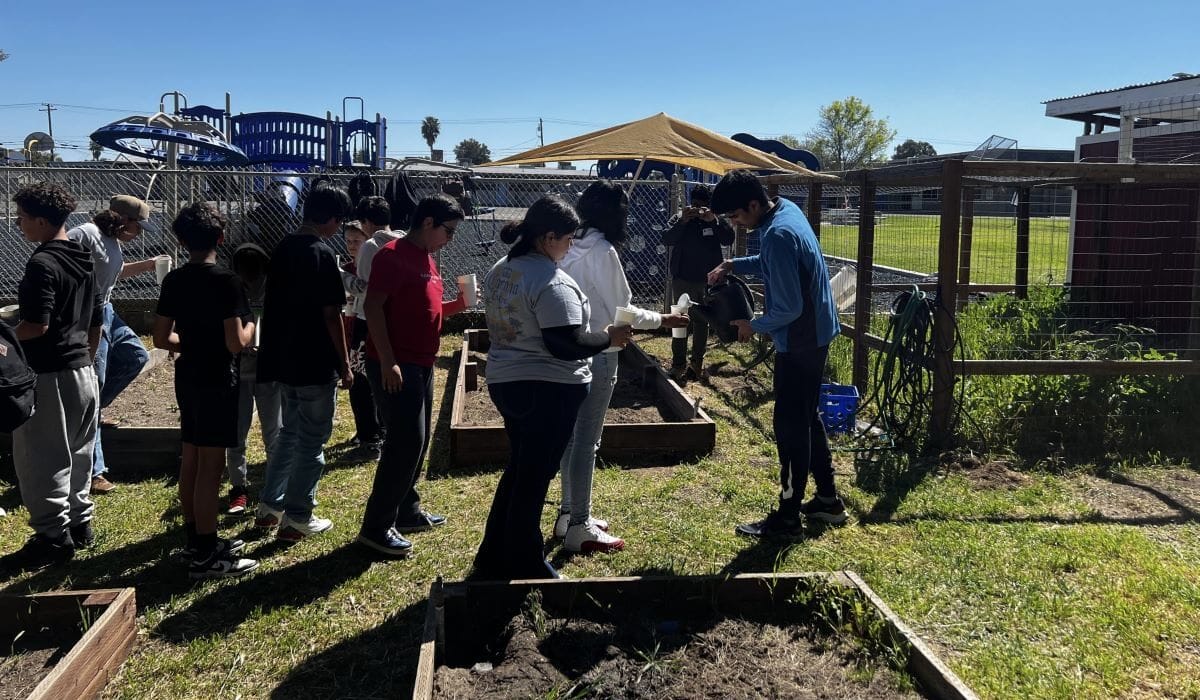Breaking Ground: California Teen Teaches Sustainable Gardening

Meet Daily Point of Light Award honoree Vishruth Dinesh. Read his story, and nominate an outstanding volunteer or family as a Daily Point of Light.
Vishruth Dinesh, 16, loves sports. Whether it’s watching the Golden State Warriors or playing competitive table tennis. For the latter, he’s competed in tournaments all the way up to nationals but equally enjoys a pickup game with friends. However, his main hobby is gardening. It started with backyard experimentation in the early days of the pandemic and led him to get involved with his school’s Garden Club.
It’s this passion for growing things and his dedication to environmentalism that led him to create The Green Therapy (TGT) in late 2022. His mission is to inspire and empower youth to become self-sustainable through gardening while simultaneously combating climate change. Partnering with schools, TGT establishes curricula and gardening-based educational programs that engage kids in outdoor learning.
So far, his 10-person team has worked with 2,500 students through workshops across 14 schools and has reached around 12,500 through educational material and campaigns. Together, program participants have planted 7,250 California-native seeds and donated 350 pounds of fresh produce to people facing food insecurity.
What inspires you to volunteer?
In the beginning of the pandemic, I started experimenting with plants and completely populated my backyard with whatever I could grow. I’d create schedules of exactly which location each plant was in, the name, how much water it needed, etc. That catapulted me into getting involved in my school’s Garden Club. My sophomore year, I became president, but I was anxious to share what I was learning beyond my school.

I’ve always been passionate about climate activism. I struggle to understand why, from the thousands of species we’re driving into extinction to mass deforestation, humans are ripping apart our own planet. But when I looked for ways to initiate change, I always found solutions I wasn’t in a position to carry out, like switching to an EV or voting for candidates promoting green policy. Sustainable gardening is something that everyone can get involved in. It’s not just beneficial from a climate action lens, but it’s something I’m genuinely passionate about. That’s why I started TGT.
Tell us about your volunteer role with The Green Therapy.
As the founder and executive director, I take on various leadership roles: overseeing finances, directing community relations and managing volunteers. I also draft and submit grant applications and expend funds for events.
Typically, we reach out to schools and identify a staff member who will serve as the garden coordinator for the year. Then, we adjust our gardening program and educational material to align with each school’s unique learning standards and expectations. We visit twice a year to host workshops that include both an educational and hands-on component. Essentially, we teach students about how to start self-sustainable gardens, the relationship between food and climate, how gardening is related to environmental concerns, and most importantly, what young people can do to fight back.
The ultimate goal of the hands-on component is to ensure that students have the knowledge to garden beyond the school environment. We guide them through the growing process, working with things like sunlight levels, irrigation strategies and pest control. Our main focus is fruit and vegetables, but we encourage schools to grow native plants to increase biodiversity. California milkweed is one of the most popular, because it attracts monarch butterflies, which are increasingly endangered.
Tell us about starting out to now working with 14 schools.
It was difficult in the beginning, because we hadn’t developed our educational program or environmental curriculum. It was hard to show people what we could bring to the table. Our first partnership with Oliveira Elementary was pivotal, because we utilized that to test out strategies and material and to learn to optimize student engagement. Once we had the basic framework set up, it was just a matter of reaching out to different schools and seeing who was interested in prioritizing environmentalism.
What’s been the most rewarding part of your work?
It’s motivating to see kids excited about nature and willing to contribute to this cause.

What have you learned through your experiences as a volunteer?
I’ve made a lot of mistakes throughout the past two years and have accepted that I’m not always going to be perfect. One time, I brought too few seeds for an event, and a fourth of the class went home that day without seeds to plant in their cup.
From forgetting to bring shovels to showing up to an event too early, I stumbled time and time again. But each time, I learned to better deal with adversity and to learn from mistakes.
I also realized how diverse we are as a community, how we have different beliefs, values and understandings of the world around us. Not everyone has to be interested in what we’re doing or passionate about environmentalism. I’ve learned to accept that and modify our material to reflect the interests of the population we’re working with.
Do you have any advice for new gardeners?
I started out growing a single tomato plant, and white and brown bulges started showing up that were symptoms of a disease. I used a pruner to shave them off, but in doing so, I made the plant more prone to disease. I’ve come a long way.
Anyone can learn about gardening if they’re passionate and spend the time. It can start in your backyard and turn into something that leads you to get involved in your school or community.
What are your long-term plans or goals for the organization?
My goal is to continue building and strengthening our school garden network. It’s also to inspire students who may want to create other initiatives to not keep their ambitions and desires bottled up. When I started this organization, I would often find myself paralyzed by uncertainty. I want to encourage people to chase their dreams and focus on things that matter to them.
Do you want to make a difference in your community like Vishruth? Find local volunteer opportunities.
